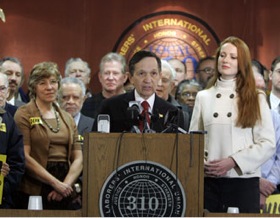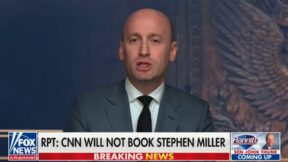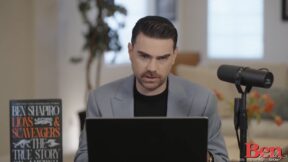Politico Shocked, Upset To Find Congressmen Enjoy National Media Attention
 To most people that have ever spent more than ten minutes of their lifetime’s exposed to professional politicians, the fact that they will use anything and everything to claw their way into the national spotlight comes as no shock. To Politico‘s Jonathan Martin, it’s an unsettling new side effect of the national conversation in health care reform.
To most people that have ever spent more than ten minutes of their lifetime’s exposed to professional politicians, the fact that they will use anything and everything to claw their way into the national spotlight comes as no shock. To Politico‘s Jonathan Martin, it’s an unsettling new side effect of the national conversation in health care reform.
Martin is upset at congressmen for using the health care debate as a tool with which to break into the news cycle. Calling them “drama queens” in a column on Friday, he argues that some representatives who have been publicly on the fence about the House bill are only claiming to be undecided to court the attention of the Democratic leadership and, thus, that of the national press. He mostly rails against Congressmen Nathan Deal and Zach Wamp, who are both running for governor in their respective states, Congressman Luis Gutierrez, and Congressman Dennis Kucinich for getting his alleged first taste of fame thanks to his wavering opposition to the bill:
“Call it the Drama Queen Caucus — members of Congress who labor mostly in obscurity, lucky to get a daytime cable hit, let alone a Sunday talk show invitation, until the big vote nears. And then they engage in an oh-so-public exercise deliberating over how they will vote or go to extraordinary ends demonstrating how strongly they feel about the way they have already decided to vote.”
Deal, Gutierrez, and Kucinich all publicly deliberated their votes at some point during the extended health care debate; Wamp passionately (and publicly) opposed it. Their embrace of their newfound attention disgusts Martin, despite the fact that it is completely typical and, actually, Congressman Kucinich wasn’t exactly “obscure” before the House began to debate the bill. Martin describes Congressman Kucinich as “previously best known for his long-shot presidential hopes, progressive politics, statuesque wife and apparent belief in UFOs, health care reform has been a publicity boon.” Yes, he is best known for all those things. He is very well-known for those things, nationally. That he received the press he did for opposing the bill was in part due to the fact that he was already a household name.
In addition to attacking a well-known Congressman for being in the news, he also fails to attack little-known Congressmen who became news riding on the relevance of the health care debate, as well. Notably absent from this list is Florida Congressman Alan Grayson who, as a freshman, was a complete unknown before he showed up on the Senate floor with something that resembled a series of bad first grade science fair posters telling Americans the Republican Party wanted them to die. Sure, his vote in favor of health care reform was never in question, but that doesn’t belie the fact that he exploited the affair to put himself in the national spotlight. While he remained a cable news darling (or villain, on Fox News) for his frequent, bizarre references to Satan, vampires, and the Holocaust, it’s his staunch support of health care reform that made him one in the first place.
While the relative benefits of having public officials in the spotlight is a worthy debate, Martin’s take is strange in that it treats it as a new phenomenon, and incomplete as it leaves out the most flagrant offenders of his own unspoken rule not to manipulate issues to gain the media’s favor.
This is an opinion piece. The views expressed in this article are those of just the author.




